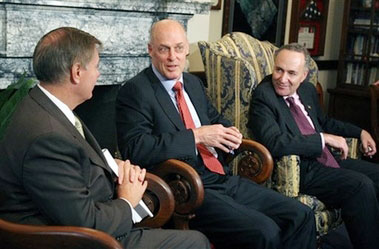WASHINGTON - The main backers of a controversial Senate bill aimed at
forcing China to revalue its currency said on Thursday they would abandon that
legislation in favor of a new bill they plan to develop early next year.
Sen.
Charles Schumer, a New York Democrat, and Sen. Lindsey Graham, a South Carolina
Republican, told reporters they had accomplished their goal of focusing more
attention on China's strict exchange rate controls, which they believe gives
Chinese companies an unfair trade advantage.

Treasury Secretary Henry Paulson, center,
meets with Sens. Lindsey Graham, R-S.C., left, and Charles Schumer,
D-N.Y., right,, in Graham's office on Capitol Hill in Washington, Tuesday,
Sept. 26, 2006. Paulson briefed the Senators on his recent trip to China.
[AP] |
At a news conference with the Senate
Finance Committee Chairman Charles Grassley, and Sen. Max Baucus, a Montana
Democrat, the four senators said they would work together to develop tough new
legislation early next year.
Schumer credited their bill threatening China with tariffs for a rise of more
than 4 percent in the value of the yuan since July 2005, but said it was time to
change tactics.
"Frankly, Lindsey and I felt it is now time to try, instead of using a blunt
instrument, to refine our instrument and pass some legislation that will force
the Chinese to go the rest of the way," Schumer said.
The Graham-Schumer bill, which was strongly opposed by the Bush
administration and most business groups, threatened to impose a 27.5 percent
tariff on China's exports to the United States unless Beijing significantly
raises the value of its currency within six months.
It was motivated by a widespread U.S. view that China's currency is
undervalued by 15 to 40 percent, giving Chinese companies an unfair advantage by
effectively subsidizing their exports and taxing imports from the United States.
The Senate voted 67-33 in favor of the Graham-Schumer legislation last year,
when it was offered as an amendment to another bill. In exchange for dropping
the issue at the time, the two senators were promised another vote on their
legislation at a later date.
That vote had been delayed several times, but the latest deadline was
September 30. The bill was unlikely to pass the House of Representatives and
become law, but opponents worried even Senate approval alone would worsen trade
relations with China.
Graham said President George W. Bush personally asked him and Schumer on
Thursday "not to take a vote, but to work with (Treasury) Secretary (Henry)
Paulson to give him a chance" to persuade China to move further on currency
reform.
All four senators vowed to develop new legislation that would be consistent
with World Trade Organization rules.
Grassley, whose committee has jurisdiction over trade, also said the bill
would not be narrowly focused on China but look broadly at the issue of how the
United States should respond to countries that do not fairly value their
currency.
Grassley and Baucus, the top Democrat on the Senate Finance Committee,
introduced legislation with those same general goals earlier this year. It would
give the Treasury Department several new tools to press countries on currency
reform.